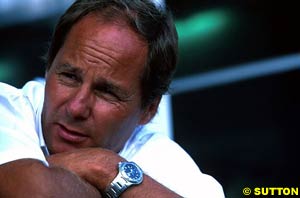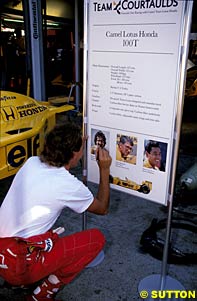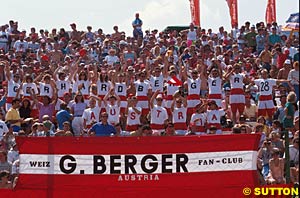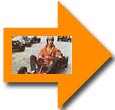
Atlas F1 Magazine Writer
 There are not many drivers whose very existance in the Formula One paddock is sure to put a smile on everyone's face, whether they are drivers, mechanics, journalists, or fans. Gerhard Berger has that rare quality of being funny, warm, talented, manipulative, popular. After nearly five years in the role of BMW's motorsport director, Berger is leaving motorsport for the sake of his family and private business. But just before he walks off into the sunset, he sat down with David Cameron for a look through his personal album of memories and anecdotes, some never before told. This is the most candid and revealing look you could ever get into the life and times of a Formula One icon... exclusive for Atlas F1
There are not many drivers whose very existance in the Formula One paddock is sure to put a smile on everyone's face, whether they are drivers, mechanics, journalists, or fans. Gerhard Berger has that rare quality of being funny, warm, talented, manipulative, popular. After nearly five years in the role of BMW's motorsport director, Berger is leaving motorsport for the sake of his family and private business. But just before he walks off into the sunset, he sat down with David Cameron for a look through his personal album of memories and anecdotes, some never before told. This is the most candid and revealing look you could ever get into the life and times of a Formula One icon... exclusive for Atlas F1
He lives the life he wanted to live, he got there with nothing but his own will and drive, and he let us in, let us live it with him and through him. For all that, no one begrudges him his time in the sun now.
Berger came from a wealthy family, as is common in the Formula One paddock, but unlike most his family didn't want him to go racing and put up as many obstacles as they could to dissuade him. He did it anyway, because it was what he wanted to do, and to prove to himself and to everyone that he could. Perhaps it was just sheer bloody-mindedness, a trait that he shares with his compatriot Niki Lauda, but it could just as easily be a passion that he has had since the day he first sat in a kart as a child and learnt first hand the addiction that is speed.
Whatever the reason, the speed with which he worked his way up into the big game is matched only by the likes of Mike Thackwell before him or Kimi Raikkonen after - he decided that it was the life he wanted, and made it happen within the span of two years. He made his Formula One debut at home with ATS (powered by a BMW engine, as it happens), was in the points at the next race, and then never looked back.
The podiums came, and then the wins, but what most people will remember from his long career is the sheer love of life that was manifest in everything he did. His sense of humour is legendary - from the stunts like sneaking into the Brabham pit to deface pictures of Nelson Piquet; to throwing the keys of Ayrton Senna's car out the window while they were driving to Monza (which necessitated a helicopter to extricate them from the fans mobbing their car); to filling Senna's bed with frogs. Each of these stunts were met by those around him with a wry chuckle, a rolling of their eyes and a comment along the lines of "oh, that's just Gerhard".
Sheene was those rough edges, the larger than life personality that would do anything, anytime without thinking of the results (on track or off), the side of him that made him use his fame and his fortune to do whatever the hell he wanted to do, when he wanted to do it. And Alesi, the mercurial driver who personified Gilles Villeneuve albeit without the wins, showed Berger how he could combine the two sides and still have time for his family, for the people around him who loved him so.
The other person who helped mould Berger was his father. Every man is defined in part by their father, through a desire to either be him or defy him, and Berger lived on both sides of this equation at various times. He defied his father by getting into racing in the first place, going against his father's expressed wishes for his son to study and follow in his footsteps by joining the family's trucking business, but he came around in the end.
In Germany 1997, after suffering a debilitating sinus problem and missing three races, no one expected anything from the aging driver, but he defied all expectation by taking pole position, fastest lap and winning the race, driving faster and faster as though being carried to the end, and decided there and then that his retirement was inevitable. He dedicated the win to his father, the man he had loved for so long and just lost in a plane crash, and then moved towards the business career his father had always wanted for him.
The move turned into the role of sporting director for BMW, then just returning to Formula One after so long away with the Williams team. Most people expected the position to be a figurehead role, a position to let him stay in the sport that he loved now that his driving days were over, but he defied expectation by working sixteen hour days to make sure that the team was the success that he knew it could be. And that success is now there for everyone to see, his business acumen and his racing knowledge combining to great effect. Reflecting on his long career, the two of us sitting in the BMW motorhome, he noted: "I had a great job with BMW, fantastic. I put in all my experience that I got over many years. I had great people and built up a team around me over many years, everything was perfect."
"But," he adds quickly, "the nicest thing in racing is to drive a racing car at the limit."
After all these years he's decided it's time for a long overdue break, and after two decades in the sport, he deserves it. "I want to have a bit more time for myself," he says, "to do a bit more sport again, take some more time for my children - they are six and seven, and I think I could at the moment take two years to give them a bit more time. And on my private side I have a few areas where I would like to work a bit closer and a bit harder on it." This private side includes his family's trucking business, run now by his sister, as well as his sponsorship agency, run out of Monaco and which would allow him to make use of his huge array of contacts in the paddock, as well as give him a side door to return if he so wished.
And he will be back, of course. After all this time in racing nothing will be able to stop him coming back to the sport eventually. "I cannot see my life without racing," he says. "What I'm definitely going to do - I don't know, and I don't want to know, because I want just now, for a year, to relax a little bit."
But we had one more job for him before the relaxation could start. "Nice and easy," I told him. "No interview - I'm just going to show you a few photos and see what you've got to say about them." The first photo put a wide smile on his face, one that stayed in place as he flicked through photos drawn from across his career. And then he started to talk...
Prologue
 Gerhard Berger is a fixture in the paddock, a face that is familiar to anyone with even a passing interest in Formula One over the last two decades, and it's strange to think that we won't be seeing him again for a while. You get used to things, and it's hard to imagine not seeing the Austrian's smiling face in the BMW motorhome. He's been going to fewer races this year since announcing his pending retirement, and with the negotiations between BMW and Williams successfully ended at the Nurburgring two weeks ago, there's less reason for him to be there, but his final day in September will still be a sad one for many.
Gerhard Berger is a fixture in the paddock, a face that is familiar to anyone with even a passing interest in Formula One over the last two decades, and it's strange to think that we won't be seeing him again for a while. You get used to things, and it's hard to imagine not seeing the Austrian's smiling face in the BMW motorhome. He's been going to fewer races this year since announcing his pending retirement, and with the negotiations between BMW and Williams successfully ended at the Nurburgring two weeks ago, there's less reason for him to be there, but his final day in September will still be a sad one for many.
 Berger has always had a lot of friends, but the three that combined to define the different parts of the man are Senna, Jean Alesi and Barry Sheene. "He taught me a lot about our sport. I taught him to laugh" - this is how Berger explains the relationship with the great Brazilian, and it's clear that his three seasons with the McLaren team rubbed the rough edges from a fast but wayward driver into someone who could take his chance and win.
Berger has always had a lot of friends, but the three that combined to define the different parts of the man are Senna, Jean Alesi and Barry Sheene. "He taught me a lot about our sport. I taught him to laugh" - this is how Berger explains the relationship with the great Brazilian, and it's clear that his three seasons with the McLaren team rubbed the rough edges from a fast but wayward driver into someone who could take his chance and win.
 Those days are over for him now, and perhaps it hurts to watch the current drivers having the fun that was once his. He has never once driven a BMW Williams, not wanting to mix business with pleasure, but maybe he'll be given the opportunity now that he is retiring. When I asked him about this possibility, and whether he'd be able to do it, he laughed and said: "I would be able to move it around, yes, but could I move it around quick? I don't know!"
Those days are over for him now, and perhaps it hurts to watch the current drivers having the fun that was once his. He has never once driven a BMW Williams, not wanting to mix business with pleasure, but maybe he'll be given the opportunity now that he is retiring. When I asked him about this possibility, and whether he'd be able to do it, he laughed and said: "I would be able to move it around, yes, but could I move it around quick? I don't know!"


Please Contact Us for permission to republish this or any other material from Atlas F1.
|
Volume 9, Issue 28
Atlas F1 Exclusive
Gerhard Berger: So Long to All That
Articles
Tifosi IPO - the Finale
Ann Bradshaw: View from the Paddock
2003 French GP Review
2003 French GP Review
Musical Chairs
In the Balance
Stats Center
Qualifying Differentials
SuperStats
Charts Center
Columns
Season Strokes
On the Road
Elsewhere in Racing
The Weekly Grapevine
> Homepage |